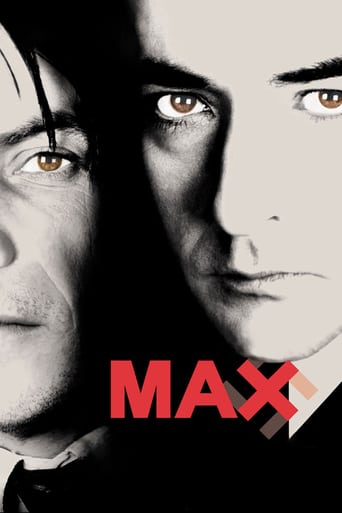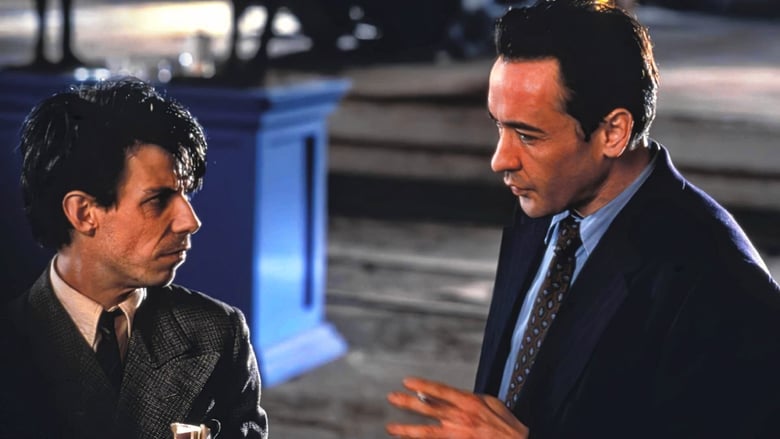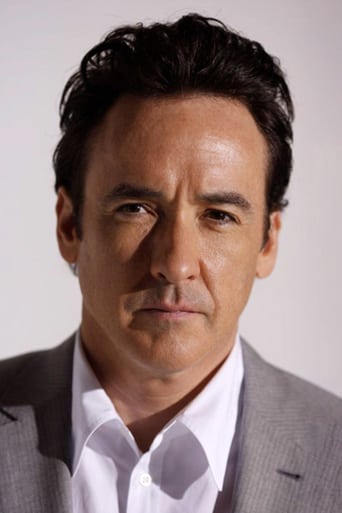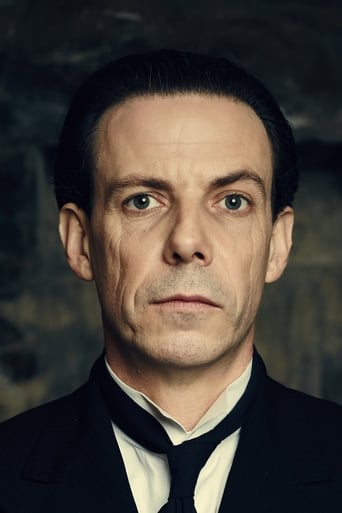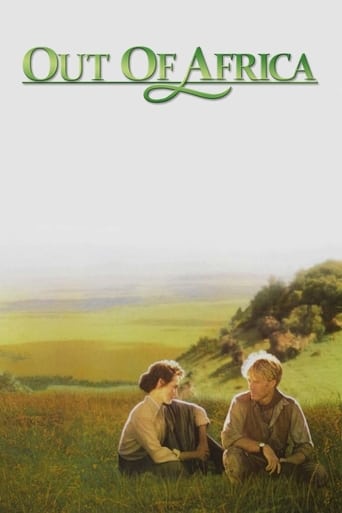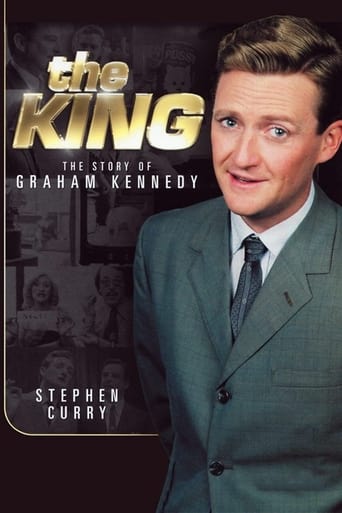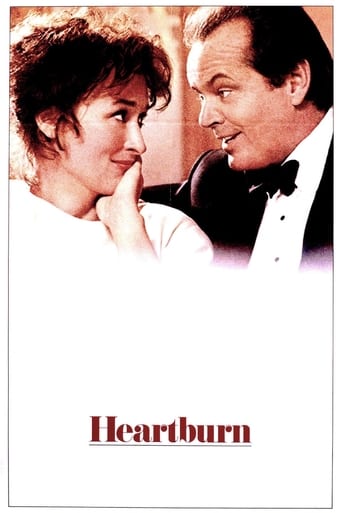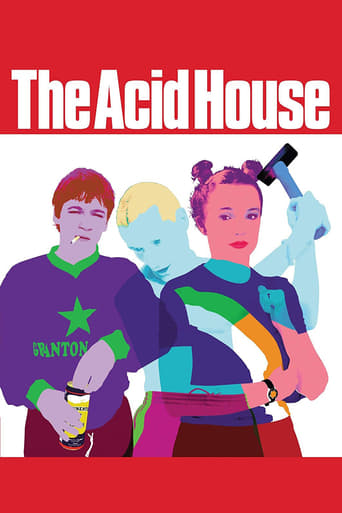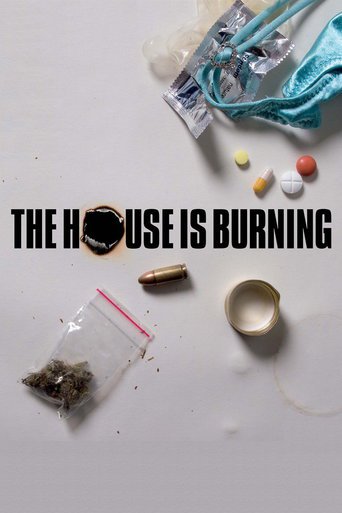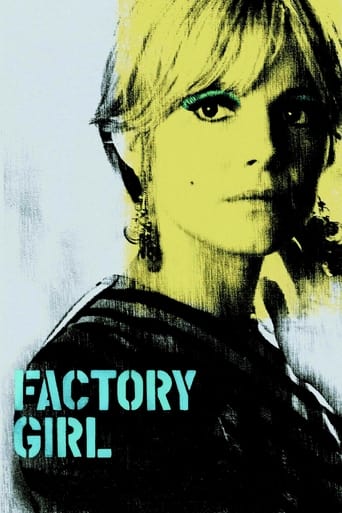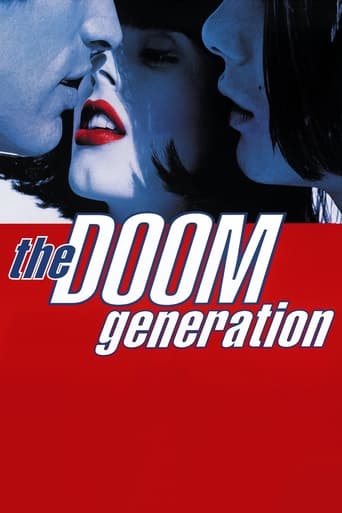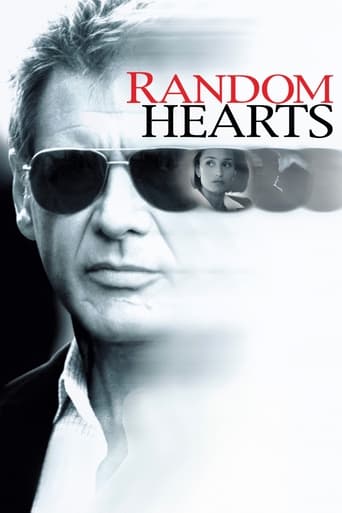Max (2002)
In 1918, a young, disillusioned Adolf Hitler strikes up a friendship with a Jewish art dealer while weighing a life of passion for art vs. talent at politics
Watch Trailer
Cast


Similar titles
Reviews
Simply Perfect
Lack of good storyline.
Wow! What a bizarre film! Unfortunately the few funny moments there were were quite overshadowed by it's completely weird and random vibe throughout.
The film never slows down or bores, plunging from one harrowing sequence to the next.
Why on Earth was this film made? I mean, really? Didn't anyone stop to think about what they were doing? In this fantasy tale in we get to see Adolf Hitler as a tortured artist. But here's the problem. This story didn't happen. And why in heaven's name do we need to see a fantasy about, for God's sake, Adolf Hitler? Don't get me wrong. I'm not offended per se by never-coulda-happened movies about Adolf Hitler. I loved "Hitler Dead or Alive." "Inglorious Basterds" was a wonderful thrill ride. But when you film an earnest character study about the formative years of the fellow who becomes the greatest evil ever known, you owe it to your audience to ground the story in reality.Things LIKE this story happened. But not this particular story. So we wind up with something so incredibly false that when I sat in my living room watching it on cable TV last night my jaw about fell open. And running through my head was the title song from "Springtime for Hitler," that brilliant musical-within-a-movie from "The Producers." At least we knew that was supposed to be a joke.I read a book years ago about Hitler's starving-artist period, and as the movie began I thought this might be an interesting story about a little-known chapter of Hitler's life. But any illusion I might have had about the movie's reality was dispelled when I saw John Cusack listening to an early-'30s tombstone radio (in 1919!), to a radio report about the signing of the Treaty of Versailles. Umm, radio broadcasting started in 1920; newscasts came later. It's sort of like seeing a movie in which Lewis and Clark settle in for the winter and spend it playing Super Mario Brothers.That was when the truth began to dawn on me, and I put the movie on pause to check the Internet and confirm my suspicion. Yes, they were making the whole thing up.From that point I watched with a growing sense of horror. Like when Hitler explains that his political speeches are actually a new form of art. Or when I watched John Cusack deliver the line, deadpan, "You're a hard man to like, Hitler." We see Hitler in 1920 or so sketching his plans for the Nuremberg rally of 1936 and for the shimmering imperial city we know from the never-built blueprints of Albert Speer. His buddy Cusack, an art dealer, delightedly pronounces them "future kitsch!" So Hitler readies them for an art exhibition that never comes off -- and because it doesn't happen he takes a different path and becomes Fuhrer instead. And the Astoundingly Manipulative Coincidence that ends the movie is really, really just too much to bear.This movie is so wretched in its conception, so appalling in its construction, and so serious about it all, that it deserves a place of honor among the worst films of all time. Heartily recommended for fans of "Plan Nine From Outer Space," but now that I've seen it I'll skip a repeat showing and go watch Hogan's Heroes instead.
MAX should be seen as a film about the many roads we face at turning points in our lives and the arbitrary, chaotic circumstances that influence what path we ultimately take. A corollary theme is the random selection -the unfairness- of birth, station in life, class, etc. In this respect the maker of MAX would be hard pressed to come up with a better setting that post WWI Germany! I disagree with those faulting historical inaccuracies. They appear to miss the point entirely. The only legitimate "fact" we must be concerned with is that Hitler indeed had a burning desire to be an artist (though I think his setting was Vienna, not Munich) and had he been successful and/or accepted as such there's a strong likelihood he'd never encountered politics (or at least on the scale he did). MAX' pure invention of Hitler's racist influences and his start to power merely indoctrinate and I didn't find them at all offensive. The invention of Cuzack's Max is a clever -and direct- counterpoint to Hitler's social circumstances. The "bonding" of Hitler and Max shreds, trashes, etc., the pseudo-logic of National Socialism in particular and racism and prejudice in general. Applause is warranted.Noah Taylor is nothing less than spectacular. John Cuzack is again a gem. The rest of the cast is reserved yet hardly a character or piece of dialog is throwaway. Just a tremendous achievement.
Someone named holmest-2 entered a user comment fraught with claims of inaccuracies in the film Max. Holmest-2 is most certainly the inaccurate one; I find it implausible that this person has even read a full biography of Hitler unless he includes Mein Kampf as an accurate portrayal of Hitler's life. In the excellent biography The Life and Death of Adolf Hitler (by James Cross Giblin), his life as a destitute street person is described. He tried to make it as an artist, was aided by a Jewish art dealer, was known to ramble about various political subjects in the day room of his government paid housing unit. Hitler captivated no one at the beginning. He was, indeed a pathetic loner, who would be befriended and then disappear as if to never get to close to anyone. For several months he was actually living on the streets of Munich. He was also painfully terrified of women and could only idealize them, yet not speak to them. Whatever holmest-2 said about Hitler's life in the immediate post WW 1 era is just plain wrong. To me the film showed Hitler as I had envisioned him in his lost years before he found his voice, his talent, and his vicious, evil inhuman purpose.
An excellent project in which Cusack excels, as he almost always does. It catches the sadness and sense of the absurd in the German art scene after the war, although it sometimes looks and feels more like Berlin than Munchen. (Wasn't George Grotz in Berlin in 1918, or was that deliberate artistic license?) In any case, the deeply melancholy undercurrent, combined with the lovely interiors, seems right to me.The film goes seriously off the rails toward the end, and a few central ideas don't work. The idea that modernism included the possibility of German fascism (and specifically the horror of Hitler and the Nazis) as a matter of course is highly subjective. The worst scene is the speech in which Hitler rails at the Jews in a hall, which came across as robotic and unconvincing. Political agitation at that time was a brawling, violent thing, in which the message of anti-Semitic German nationalists was communicated through beating people up as much as through any words. There was an intense atmosphere of systematic violence at those meetings, at least in the early days. Hitler's speech doesn't come close to capturing that, and misses the fact that whereas the far right had been anti-Semitic for a long time, most mainstream Germans had not been exposed to it that much, and thought it rather operatic and not particularly appealing as a political message. They wanted to hear other things, especially about the humiliation of Germany by the Great Powers, with anti-Semitism gaining momentum later in the 1920s. Many people will say that it's wrong to humanize Hitler and the Nazis, but that's wrong. People who make that objection want to believe that there is no Nazi in themselves, that they are completely without the capacity to commit evil. But the Nazi is in all of us, including some Jews who have internalized the aggression once directed against them. To defeat the Nazi that exists in everybody, you have to know that it's there inside you. Only if you know it's there, can you chose not to act on it.This film could be usefully viewed along with two excellent German films about Sophie Scholl and the White Rose, a group of idealistic young students and soldiers in Munchen (Munich) that in 1943 tried to overthrow Hitler and paid with their lives. Both movies are available in DVD on Amazon.com with subtitles. Different period, same moral and existential challenges.

